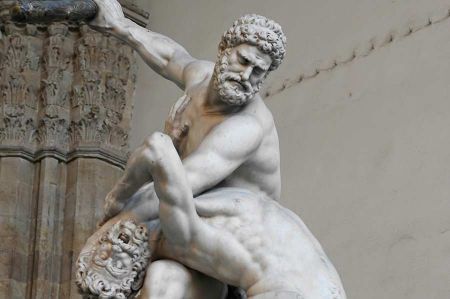Heracles - Salvation- and Oracle God
Heracles was a divine hero in Greek mythology, the son of Zeus and Alcmene, foster son of Amphitryon and great-grandson (and half-brother) of Perseus. He was the greatest of the Greek heroes,a paragon of masculinity, the ancestor of royal clans who claimed to be Heracleidae.
In Rome and the modern West, he is known as Hercules, with whom the later Roman Emperors, in particular Commodus and Maximian, often identified themselves.
Extraordinary strength, courage, ingenuity, and sexual prowess with both males and females were among his characteristic attributes. Although he was not as clever as the likes of Odysseus or Nestor, Heracles used his wits on several occasions when his strength did not suffice, such as when labouring for the king Augeas of Elis, wrestling the giant Antaeus, or tricking Atlas into taking the sky back onto his shoulders. Together with Hermes he was the patron and protector of gymnasia and palaestrae.
A major factor in the well-known tragedies surrounding Heracles is the hatred that the goddess Hera, wife of Zeus, had for him. A full account of Heracles must render it clear why Heracles was so tormented by Hera, when there are many illegitimate offspring sired by Zeus. Heracles was the son of the affair Zeus had with the mortal woman Alcmene. Zeus made love to her after disguising himself as her husband, Amphitryon, home early from war (Amphitryon did return later the same night, and Alcmene became pregnant with his son at the same time, a case of heteropaternal superfecundation, where a woman carries twins sired by different fathers). Thus, Heracles' very existence proved at least one of Zeus' many illicit affairs, and Hera often conspired against Zeus' mortal offspring, as revenge for her husband's infidelities. His twin mortal brother, son of Amphitryon was Iphicles, father of Heracles' charioteer Iolaus.
On the night the twins Heracles and Iphicles were to be born, Hera, knowing of her husband Zeus' adultery, persuaded Zeus to swear an oath that the child born that night to a member of the House of Perseus would be High King. Hera did this knowing that while Heracles was to be born a descendant of Perseus, so too was Eurystheus. Once the oath was sworn, Hera hurried to Alcmene's dwelling and slowed the birth of Heracles by forcing Ilithyia, goddess of childbirth, to sit crosslegged with her clothing tied in knots, thereby causing Heracles to be trapped in the womb. Meanwhile, Hera caused Eurystheus to be born prematurely, making him High King in place of Heracles. She would have permanently delayed Heracles' birth had she not been fooled by Galanthis, Alcmene's servant, who lied to Ilithyia, saying that Alcmene had already delivered the baby. Upon hearing this, she jumped in surprise, untying the knots and inadvertently allowing Alcmene to give birth to her twins, Heracles and Iphicles.
The child was originally given the name Alcides by his parents; it was only later that he became known as Heracles. He was renamed Heracles in an unsuccessful attempt to mollify Hera. A few months after he was born, Hera sent two serpents to kill him as he lay in his cot. Heracles throttled a snake in each hand and was found by his nurse playing with their limp bodies as if they were child's toys.
Driven mad by Hera, Heracles slew his own children. To expiate the crime, Heracles was required to carry out ten labors set by his archenemy, Eurystheus, who had become king in Heracles' place. If he succeeded, he would be purified of his sin and, as myth says, he would be granted immortality. Heracles accomplished these tasks, but Eurystheus did not accept the cleansing of the Augean stables because Heracles was going to accept pay for the labor. Neither did he accept the killing of the Lernaean Hydra as Heracles' cousin, Ioloas, had helped him burn the stumps of the heads. Eurysteus set two more tasks (fetching the Golden Apples of Hesperides and capturing Cerberus), which Heracles performed successfully, bringing the total number of tasks up to twelve.
Not all writers gave the labors in the same order. Apollodorus (2.5.1-2.5.12) gives the following order:
1. To kill the Nemean lion.
2. To destroy the Lernaean Hydra.
3. To capture the Ceryneian Hind.
4. To capture the Erymanthian Boar.
5. To clean the Augean Stables.
6. To kill the Stymphalian Birds.
7. To capture the Cretan Bull.
8. To round up the Mares of Diomedes.
9. To steal the Girdle of Hippolyte.
10. To herd the Cattle of Geryon.
11. To fetch the Apples of Hesperides.
12. To capture Cerberus.
Further adventures
After completing these tasks, Heracles joined the Argonauts in a search for the Golden Fleece. They rescued heroines, conquered Troy, and helped the gods fight against the Gigantes. He also fell in love with Princess Iole of Oechalia. King Eurytus of Oechalia promised his daughter, Iole, to whoever could beat his sons in an archery contest. Heracles won but Eurytus abandoned his promise. Heracles' advances were spurned by the king and his sons, except for one: Iole's brother Iphitus. Heracles killed the king and his sons–excluding Iphitus–and abducted Iole. Iphitus became Heracles' best friend. However, once again, Hera drove Heracles mad and he threw Iphitus over the city wall to his death. Once again, Heracles purified himself through three years of servitude - this time to Queen Omphale of Lydia.
Please read as well:
Zeus - the King of Gods from Mount Olymp
Poseidon or Neptunus - God of the Sea
